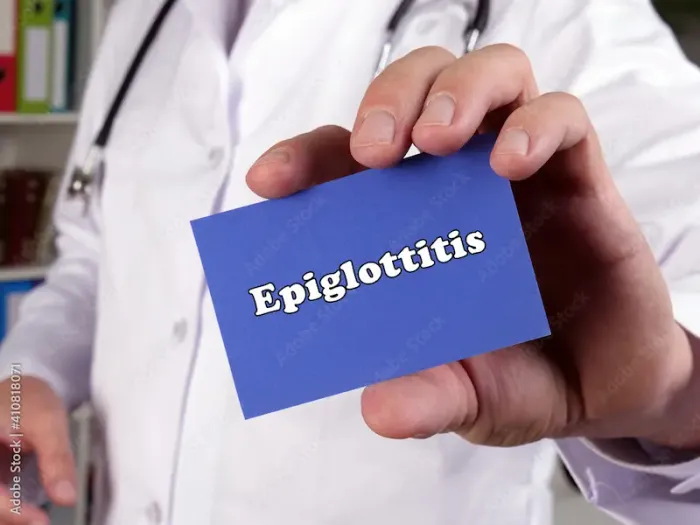Epiglottitis Overview Symptoms, Causes, and Treatment
Epiglottitis is a serious inflammation of the epiglottis that can block airflow. Learn about its symptoms, causes, and urgent treatment options to ensure prompt medical care and recovery.

Written by Dr. Mohammed Kamran
Reviewed by Dr. Dhankecha Mayank Dineshbhai MBBS
Last updated on 25th Aug, 2025

Epiglottitis is a serious medical condition that affects the epiglottis—a small flap of tissue at the base of the tongue that prevents food from entering the windpipe when swallowing. When the epiglottis becomes swollen, it can block the airway, making it difficult to breathe. This condition requires immediate medical attention.
In this article, we’ll discuss the symptoms, causes, and treatment options for epiglottitis in simple terms. We’ll also share tips on prevention and when to seek emergency care.
What is Epiglottitis?
The epiglottis is a flexible cartilage structure that acts like a lid, covering the windpipe (trachea) when you swallow. If it becomes inflamed due to infection or injury, it can swell rapidly, leading to life-threatening breathing difficulties.
Epiglottitis can occur in both children and adults, though it is less common today due to vaccinations like the Hib (Haemophilus influenzae type b) vaccine.
Symptoms of Epiglottitis
Epiglottitis symptoms develop quickly and worsen within hours. If you or someone you know experiences these signs, seek emergency medical help immediately:
Common Symptoms in Children:
• Severe sore throat
• High fever
• Drooling (due to difficulty swallowing)
• A muffled or hoarse voice
• Difficulty breathing (may lean forward with mouth open to breathe)
• Stridor (a high-pitched sound while inhaling)
• Restlessness or anxiety
Common Symptoms in Adults:
• Severe throat pain
• Difficulty swallowing
• Fever
• Drooling
• A muffled voice
• Breathing difficulties
Note: Never try to examine the throat yourself, as this can worsen swelling and block the airway.
Consult Top Specialists To Examine Your Throat
What Causes Epiglottitis?
The most common cause of epiglottitis used to be Haemophilus influenzae type b (Hib), a bacterial infection. However, due to widespread Hib vaccination, cases have significantly reduced. Other possible causes include:
• Bacterial infections (Streptococcus pneumoniae, Staphylococcus aureus)
• Viral infections (such as those causing colds or flu)
• Fungal infections (rare)
• Trauma (from burns, throat injuries, or inhaling irritants)
• Smoking or hot liquids (can cause irritation)
How is Epiglottitis Diagnosed?
Since epiglottitis is a medical emergency, doctors act quickly. They may:
• Examine the throat carefully (often in a controlled setting to avoid airway blockage).
• Use a laryngoscope (a thin, flexible tube with a light) to check the epiglottis.
• Order X-rays or CT scans to assess swelling.
• Perform blood tests or throat cultures to identify the infection.
Treatment for Epiglottitis
Epiglottitis requires immediate hospitalisation. Treatment focuses on:
1. Securing the Airway
• Doctors may insert a breathing tube (intubation) or perform a tracheostomy (a small hole in the windpipe) if swelling blocks breathing.
2. Antibiotics
• If a bacterial infection is the cause, IV antibiotics are given to fight the infection.
3. Steroids or Anti-inflammatory Medicines
• These help reduce swelling in the throat.
4. Fluids and Oxygen Support
• IV fluids keep the body hydrated, and oxygen therapy helps with breathing.
Most people recover fully with prompt treatment, but delaying care can be fatal.
Can Epiglottitis Be Prevented?
Yes! The best prevention is vaccination:
• Hib vaccine (given to infants in multiple doses)
• Pneumococcal vaccine (protects against Streptococcus pneumoniae)
Other Preventive Measures:
• Avoid smoking or inhaling irritants.
• Practice good hygiene to prevent infections.
• Seek medical help early for severe throat pain or breathing difficulties.
When to See a Doctor?
Epiglottitis is a medical emergency. Call for help if you or your child has:
• Sudden difficulty breathing
• Severe throat pain with drooling
• High fever with stridor (noisy breathing)
Do not wait—rush to the nearest emergency room.
Conclusion
Epiglottitis is rare but dangerous. Thanks to vaccines, cases have decreased, but awareness is still crucial. If you suspect epiglottitis, act fast—early treatment saves lives.
If you have concerns about throat infections or need vaccination advice, consult a doctor. You can book an appointment with an ENT specialist on Apollo 24|7 for expert guidance.
Consult Top Specialists To Examine Your Throat
Consult Top Specialists To Examine Your Throat

Dr. Sourav Banerjee
Ent Specialist
5 Years • MBBS, MS (Otorihnolaryngology)
New Delhi
THE DOCTORS NESST, New Delhi

Dr. M Venkata Apparao
Ent Specialist
25 Years • MBBS MS
Visakhapatnam
Apparao ENT CLINIC, Visakhapatnam

Dr. Krishan Rajbhar
Ent Specialist
8 Years • MBBS, MS(ENT), Fellowship in Neurotology Fellowship in Middle Ear Surgery & Cochlear Implant, Fellowship in Allergy & Asthma
Kolkata
Dr. Krishan Rajbhar's Clinic, Kolkata
(150+ Patients)

Dr. Nirupama Reddy
Ent Specialist
5 Years • MBBS, MS (Oto Rhino Laryngology)
Hyderabad
Nirupama clinic, Hyderabad
Dr. Suresh Tarikere Laxman
Ent Specialist
26 Years • M.B.B.S , M.S, DIPLOMA IN THYROID & DIABETES
Bengaluru
Surya Ent Clinic, Bengaluru
Consult Top Specialists To Examine Your Throat

Dr. Sourav Banerjee
Ent Specialist
5 Years • MBBS, MS (Otorihnolaryngology)
New Delhi
THE DOCTORS NESST, New Delhi

Dr. M Venkata Apparao
Ent Specialist
25 Years • MBBS MS
Visakhapatnam
Apparao ENT CLINIC, Visakhapatnam

Dr. Krishan Rajbhar
Ent Specialist
8 Years • MBBS, MS(ENT), Fellowship in Neurotology Fellowship in Middle Ear Surgery & Cochlear Implant, Fellowship in Allergy & Asthma
Kolkata
Dr. Krishan Rajbhar's Clinic, Kolkata
(150+ Patients)

Dr. Nirupama Reddy
Ent Specialist
5 Years • MBBS, MS (Oto Rhino Laryngology)
Hyderabad
Nirupama clinic, Hyderabad
Dr. Suresh Tarikere Laxman
Ent Specialist
26 Years • M.B.B.S , M.S, DIPLOMA IN THYROID & DIABETES
Bengaluru
Surya Ent Clinic, Bengaluru




